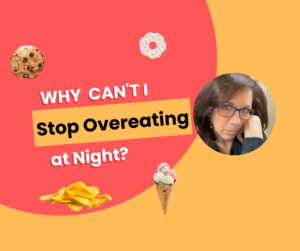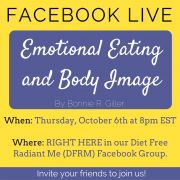How to Tackle Nighttime Overeating and Binge Eating
 Do you find yourself coming home from work after a long day and immediately heading to the fridge? Does it feel like this eating is “out of control”?
Do you find yourself coming home from work after a long day and immediately heading to the fridge? Does it feel like this eating is “out of control”?
There are many reasons why you may be overeating or binge eating at night when you are not physically hungry.
- You’re not eating enough during the da,y leading to feelings of ravenous hunger at night.
- You are eating for reasons other than biological hunger, such as emotional hunger, boredom, loneliness, sadness, etc.
- You ignore the signs of hunger throughout the day.
- You are using food as a way to unwind or relax at night due to a hard day or general life stressors.
- Eating at night is a habit or a part of your routine (that you just can’t break)
Once you’ve identified when and why you may overeat and binge eat at night—how do you confront this issue?
Here are four ways to end the struggle with nighttime eating:
(1) Eat consistently throughout the day.
Eating meals throughout the day ensures sustained energy, limits glucose spikes and crashes and can be just what you need to stop overeating and bingeing at night.
Ensure your meals have a balanced amount of macronutrients—carbohydrates, protein and fat.
If you are a chronic dieter, it’s quite possible that you aren’t including this very important nutrient with your meals – carbohydrates! Part of embracing Intuitive Eating is recognizing that all food groups are nutrients fit! Carbs are the preferred fuel source for your body. Add carbs back to your meals throughout the day, and you may just see those nighttime binges disappear.
(2) Power up with snacks.
Overeating at night is more than likely due to a lack of sustained fuel throughout the day. Having large gaps between meals with no food can leave you feeling ravenous by the time your next meal comes around.
If you have a good rule that states “no eating in between meals”, it’s time to toss that rule to the curb. Adding in a snack, either between breakfast and lunch, or between lunch and dinner could prevent those serious hunger pangs that leads to overeating, both at dinner and late at night.
Here are some snack suggestions:
- Cheese, fruit, and crackers
- Yogurt and granola
- A handful of trail mix
- An apple or banana with almond butter
(3) Listen to your hunger cues.
Ignoring hunger cues will more than likely lead to overeating. Choosing to listen to the signals of your body will allow you to give your body what it needs. This in turn will help you build back trust with your body.
This feeling of trust is important to develop since dieting has stripped you of trust. If you’re holding onto a limiting belief around hunger and fullness, then work on reframing these beliefs into more empowering true beliefs.
For example, if you think “I can’t trust my hunger and fullness signals”, flip it around and start to tell yourself “I CAN eat when hungry and stop when full.”
(4) Check in on old dieter habits.
Do you find yourself defaulting to old dieting habits? Do you:
- Only include certain foods in your meals
- Deny yourself certain foods because they’re “bad”
- Skip meals
- Hold onto food rules (ex: no snacking during the day)
- Ignore your hunger cues
These habits are deep rooted in your diet mentality—check in with yourself to identify if these habits may be surfacing. The only solution is to grant yourself unconditional permission to eat and allow yourself foods that satisfy you.
Still stuck in the spell of diets? Pop your name and email in the boxes below and start your journey towards breaking the spell of diets and developing TRUST!












Leave a Reply
Want to join the discussion?Feel free to contribute!